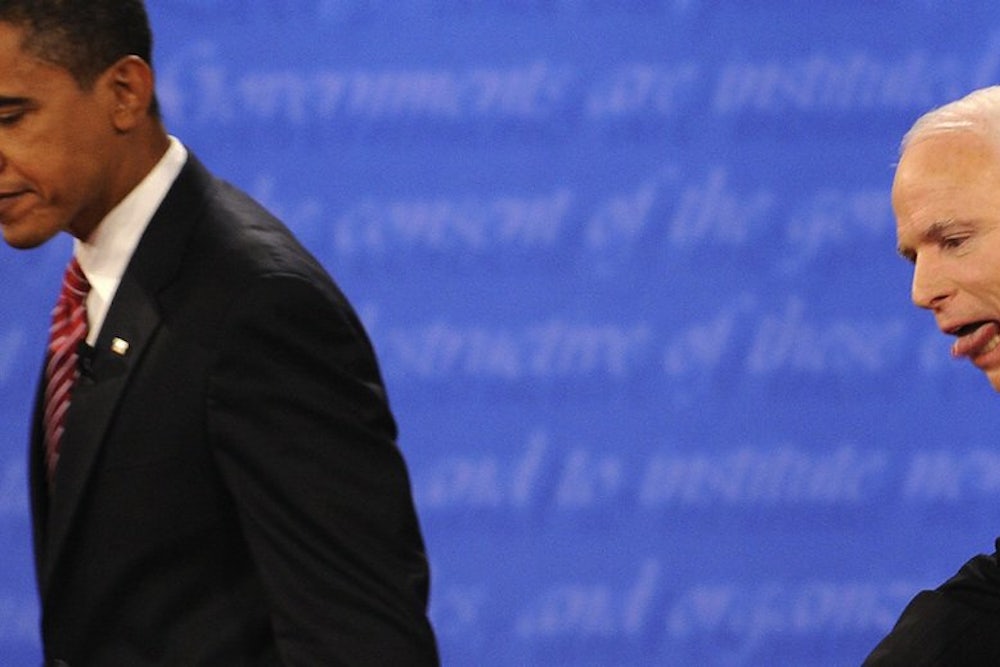Did you hear the news? President Obama and John McCain are now chummy. To the point where McCain, according to Politico, is now "President Obama's newest ally." Apparently Saxby Chambliss' hole-in-one while golfing with the President wasn't impressive enough to earn him that title.
"It’s unclear whether an alliance with McCain can break the gridlock in Washington," the story's photo caption says. But let's give the article some credit: It doesn't use the word "maverick" until the bottom of the second page. Nevertheless, we are told the "shift is striking" in the allegedly changing relationship between the two allegedly former enemies. "Suddenly, the two are working together on issues ranging from immigration to the deficit." And, or perhaps except, for everything in between.
McCain has long been an immigration dove, except for the last time he was last running for reelection and started spouting off about a border fence to fool Arizona primary voters into thinking he cared about them again. On a budget deficit agreement, he's spent the last year or so suggesting that spending cuts could be matched with tax revenue increases in order to produce an agreement. Because he doesn't really care. His main issues are advocating for bombing freedom into new countries and landing Sunday morning television hits each week.
And yet an Obama-McCain alliance has been a persistent Beltway fantasy. (Also: a nightmare of Rick Santorum.) Within days of Obama's 2008 triumph, the two got together and pledged to "work together." Politico called it the beginning of a "rocky alliance." It never happened, and there has been no awakening in the past few months. McCain lets the president take him out to a fancy dinner every now and then, and he'll chit-chat with Denis McDonough. But if McCain and Obama are Ronnie-and-Tipping it, it's not because either of them enjoy each other's company—a non-relationship that the weird Washington press corps has an aggressive matchmaker's yearning to foster.
McCain has long seen Obama as, well, a whippersnapper, even before they ran against each other for president. In early 2006, when Obama had but a year under his belt in the Senate, McCain felt that his future rival was showing "disingenuousness" and trying to back out of a reform effort for political purposes. He dispatched a tart letter to the future president, as a tenured professor would to a student asking for an extension:
I would like to apologize to you for assuming that your private assurances to me regarding your desire to cooperate in our efforts to negotiate bipartisan lobbying reform legislation were sincere. When you approached me and insisted that despite your leadership’s preference to use the issue to gain a political advantage in the 2006 elections, you were personally committed to achieving a result that would reflect credit on the entire Senate and offer the country a better example of political leadership, I concluded your professed concern for the institution and the public interest was genuine and admirable. Thank you for disabusing me of such notions with your letter to me dated February 2, 2006, which explained your decision to withdraw from our bipartisan discussions. I’m embarrassed to admit that after all these years in politics I failed to interpret your previous assurances as typical rhetorical gloss routinely used in politics to make self-interested partisan posturing appear more noble. Again, sorry for the confusion, but please be assured I won’t make the same mistake again.
After the 2008 election, McCain's young-whippersnapper condescension to a junior senator became… young-whippersnapper condescension to the President of the United States. McCain, as the Politico piece notes, "has a reputation of seeking political revenge against his enemies." That would have been more than enough reason for him to seek Obama's total destruction on its own. But McCain's 2010 reelection campaign offered another opportunity for him, as McCain once wrote about Obama, to engage in the "typical rhetorical gloss routinely used in politics to make self-interested partisan posturing appear more noble."
He kept the administration's first-term immigration reform ambitions at arm's length. He stopped believing that climate change was a problem. ("He [McCain] can’t do it this year," McCain's dear friend Sen. Joe Lieberman reportedly told an aide about a climate change bill.) Shortly after his reelection in late 2010, and in a rare attempt to keep a pledge he'd made to Republican primary voters, McCain made a fool of himself trying, and failing, to block the repeal of "Don't Ask, Don't Tell."
And yet the press extends an olive branch to McCain whenever he makes even the faintest gesture toward His Old Maverick Self. In early 2011, McCain mentioned that he appreciated President Obama's speech at the memorial for those shot in Tucson, Arizona that January. He and Obama connected for a meeting in the White House afterwards. That was all Time needed to plug a few new words into the old template and get up a quickie piece titled, "After Marching Rightward, the Maverick McCain May Be Back."
"Friends and colleagues say they have noticed a marked change in McCain," Time's giddy scribe noted, before sticking his finger much deeper down the reader's throat:
So, is the redoubtable maverick back? One longtime McCain watcher thinks so. "It appears Mac is back on track to be a player of significance and importance on the center stage of American politics," notes his old friend and adviser Mark McKinnon of the 74-year-old Arizona senator. "The Lion in winter is starting to roar."
Here we are a couple of years later. The two are still following their own personal political incentives, as they always have. But now that they've feasted on moulard duck breast and Colorado lamb acai during a group hangout, the attention has once again turned to whether their overlapping priorities "can break the gridlock in Washington." Let me spare you any unnecessary excitement: The answer is no.
Jim Newell is a political writer in Washington. He has written for Wonkette, Gawker, The Guardian, The Baffler, and Salon.
